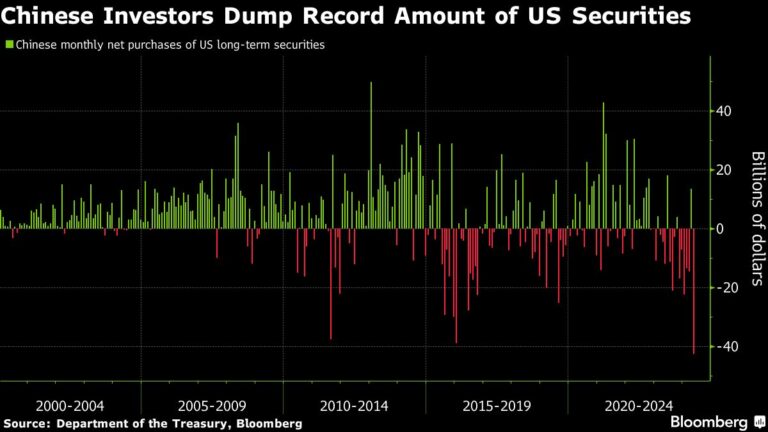(Bloomberg) — Chinese investors sold a record amount of U.S. stocks and Treasuries in May as diplomatic tensions between the world’s two largest economies remained high.
Most read articles on Bloomberg
The Asian nation’s funds sold a net $42.6 billion in long-term securities – government, agency, corporate and other debt securities and stocks – according to the latest data released by the U.S. Treasury Department on Thursday. Sales in the first five months of the year totaled $79.7 billion, the highest on record for the January-May period.
Uncertainty over the U.S. presidential election may have prompted Chinese investors to sell Treasuries to reduce risk, said Billy Leung, investment strategist at Global X Management in Sydney. “There could also be political influences to reduce dollar holdings,” he said.
More than half of the debt sold were Treasuries, followed by agency debt and stocks. The yield on the benchmark 10-year Treasury note rose to its highest level since November on April 25.
China is one of the largest foreign holders of U.S. Treasuries, and bond investors and geopolitical strategists are closely watching capital flows from the country. Rising tensions between the U.S. and China have often fueled speculation that China might shift its foreign-currency reserves out of U.S. assets, which would likely put upward pressure on yields.
“Given the overvalued US dollar, expensive valuations of US stocks relative to Chinese stocks and growing liquidity needs due to debt deleveraging, Chinese investors have every reason to diversify out of US assets,” said Wei-Liang Zhang, macro strategist at DBS Bank. “Given economic fundamentals and political uncertainty surrounding the US elections, the divestment trend is likely to continue.”
The U.S. government data also has shortcomings: U.S. securities held in custodial accounts in third countries do not show up as Chinese securities.
China’s holdings of government bonds and notes have fallen by $440 billion since the end of 2017. During that same period, securities holdings in Belgium, widely seen as the home of China’s securities custody account, increased by $159 billion. China’s holdings of U.S. stocks, agency bonds and other debt have also increased, suggesting that China may be replacing its dollar assets rather than reducing them.
Still, the prospect of further monetary easing from the Federal Reserve and a resulting weakening of the dollar may discourage Chinese investors from holding too many dollar assets, said Ken Wong, an Asia equity portfolio specialist at Eastspring Investments in Hong Kong.
A weaker dollar could make investing in domestic securities “more attractive,” he said.
(Adds strategist comment)
Most read articles on Bloomberg Businessweek
©2024 Bloomberg LP

